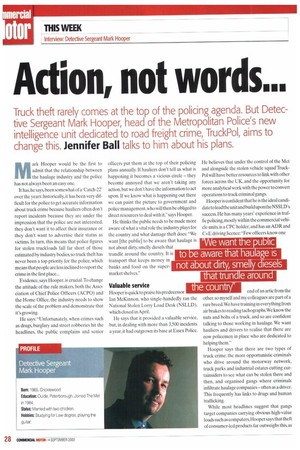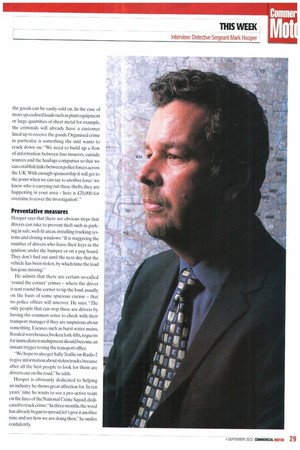Action, not words...
Page 28

Page 29

If you've noticed an error in this article please click here to report it so we can fix it.
Truck theft rarely comes at the top of the policing agenda. But Detec tive Sergeant Mark Hooper, head of the Metropolitan Police's new intelligence unit dedicated to road freight crime, TruckPol, aims to change this. Jennifer Ball talks to him about his plans.
Mark Hooper would be the first to admit that the relationship between the haulage industry and the police has not always been an easy one.
It has, he says, been somewhat of a 'Catch-22' over the years: historically, it has been very difficult for the police to get accurate information about truck crime because hauliers often don't report incidents because they are under the impression that the police are not interested, they don't want it to affect their insurance or they don't want to advertise their status as victims. In turn, this means that police figures for stolen truckloads fall far short of those estimated by industry bodies, so truck theft has never been a top priority for the police, which means that people are less inclined to report the crime in the first place...
Evidence, says Hooper, is crucial. To change the attitude of the rule makers, both the Association of Chief Police Officers (ACPO) and the Home Office, the industry needs to show the scale of the problem and demonstrate that it's growing.
He says: "Unfortunately, when crimes such as drugs, burglary and street robberies hit the headlines, the public complains and senior officers put them at the top of their policing plans annually. If hauliers don't tell us what is happening it becomes a vicious circle — they become annoyed that we aren't taking any action, but we don't have the information to act upon. If we know what is happening out there we can paint the picture to government and police management,who will then be obliged to direct resources to deal with it." says Hooper.
Valuable service
Hooper is quick to praise his predecessor Ian McKinnon, who single-handedly ran the National Stolen Lorry Load Desk (NSLLD), which closed in April.
He says that it provided a valuable service, but, in dealing with more than 3,500 incidents a year, it had outgrown its base at Essex Police. He believes that under the control of the Met and alongside the stolen vehicle squad TruckPol will have better resources to link with other forces across the UK, and the opportunity for more analytical work with the power to convert operations to track criminal gangs.
Hooper is confident that he is the ideal candidate to lead the unit and buildupon the NSSLD's success. He has many years' experience in traffic policing, mostly within the commercial vehicle units, is a CPC holder, and has an ADR and C+E driving licence: "Few officers know one end of an artic from the other, so myself and my colleagues are part of a rare breed.We have training in everything from air brakes to reading tachographs.We know the nuts and bolts of a truck, and so are confident talking to those working in haulage. We want hauliers and drivers to realise that there are now policemen in place who are dedicated to helping them."
Hooper says that there are two types of truck crime: the more opportunistic criminals who drive around the motorway network, truck parks and industrial estates cutting curtainsiders to see what can be stolen there and then, and organised gangs where criminals infiltrate haulage companies— often as a driver. This frequently has links to drugs and human trafficking.
While most headlines suggest that gangs target companies carrying obvious high-value loads such as computers, Hooper says that theft of consumer-led products far outweighs this, as the goods can be easily sold on. In the case of more specialised loads such as plant equipment or large quantities of sheet metal for example, the criminals will already have a customer lined up to receive the goods. Organised crime in particular is something the unit wants to crack down on: "We need to build up a flow of information between loss insurers, outside sources and the haulage companies so that we can establish links between police forces across the UK. With enough sponsorship it will get to the point when we can say to another force we know who is carrying out these thefts, they are happening in your area — here is £20,000 for overtime to cover the investigation'."
Preventative measures Hooper says that there are obvious steps that drivers can take to prevent theft such as parking in safe, well-lit areas, installing tracking systems and closing windows: "It is staggering the number of drivers who leave their keys in the ignition, under the bumper or on a peg board. They don't find out until the next day that the vehicle has been stolen, by which time the load has gone missing."
He admits that there are certain so-called 'round the corner' crimes — where the driver is sent round the corner to tip the load, usually on the basis of some spurious excuse — that no police officer will uncover. He says: "The only people that can stop these are drivers by having the common sense to check with their transport manager if they are suspicious about something. Excuses such as burst water mains, flooded warehouses, broken fork-lifts, requests for immediate transhipment should become an instant trigger to ring the transport office.
"We hope to also get Sally Traffic on Radio 2 to give information about stolen trucks,because after all the best people to look for them are drivers out on the road," he adds.
Hooper is obviously dedicated to helping an industry he shows great affection for. In ten years' time he wants to see a pro-active team on the lines of the National Crime Squad, dedicated to truck crime:"ln three months, the word has already began to spread; let's give it another nine and see how we are doing then," he smiles confidently.
















































































































































































































